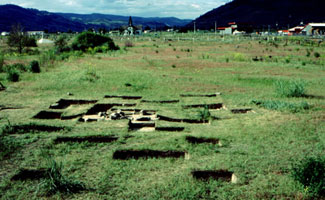Arts Menu
Anthropology
Anthropology at TRU addresses the human condition in all its past and present manifestations.
Within the sub-fields of archaeology and physical anthropology, we examine the biological and cultural evolution of our species and try to reconstruct prehistoric societies with the help of artifacts and other manifestations of human activity. Within the sub-fields of cultural and social anthropology, we are interested in the diversity of contemporary societies and cultures around the world.
Our common focus distinguishes anthropology from other academic subjects taught at TRU in these four important principles:
Global perspective
We emphasize the need to study a wide range of societies (past and present) in order to minimize the ethnocentric assumption that what we see around us 'here and now' is the only or the best manifestation of humanity;
Fieldwork
Our methodology is based on direct, unmediated, contact with our subject matter. In archaeology this means the necessity to conduct 'digs' and confront directly the material evidence needed for the reconstruction of past social and cultural forms. In socio-cultural anthropology it leads to time-consuming investigations by means of 'participant observation'. We emphasize the contribution of these direct confrontations with the raw reality of cultural diversity at a time when computer-based learning and instruction threaten to impose a shallow and one-dimensional acquaintance with humanity;
Advancement of knowledge
We pursue our interests in social and cultural diversity for scholarly rather than profit-motivated reasons. As more and more academic and applied disciplines profess an interest in societies traditionally studied by anthropologists (international business, tourism, security studies, etc.), it is important to keep in mind that these incursions are usually market-driven (the search for global markets, international students, exotic destinations for western tourists) and, therefore, highly selective.
Social justice
Whenever possible, we try to use our knowledge of diverse societies and cultures in order to help redress the power imbalance that prevails in the modern world. This imbalance is expressed in a wide range of injustices imposed by the 'developed' world onto politically weak peoples and minorities, such as resource exploitation, expulsion from ancestral territories, forcible assimilation, and outright genocide.


